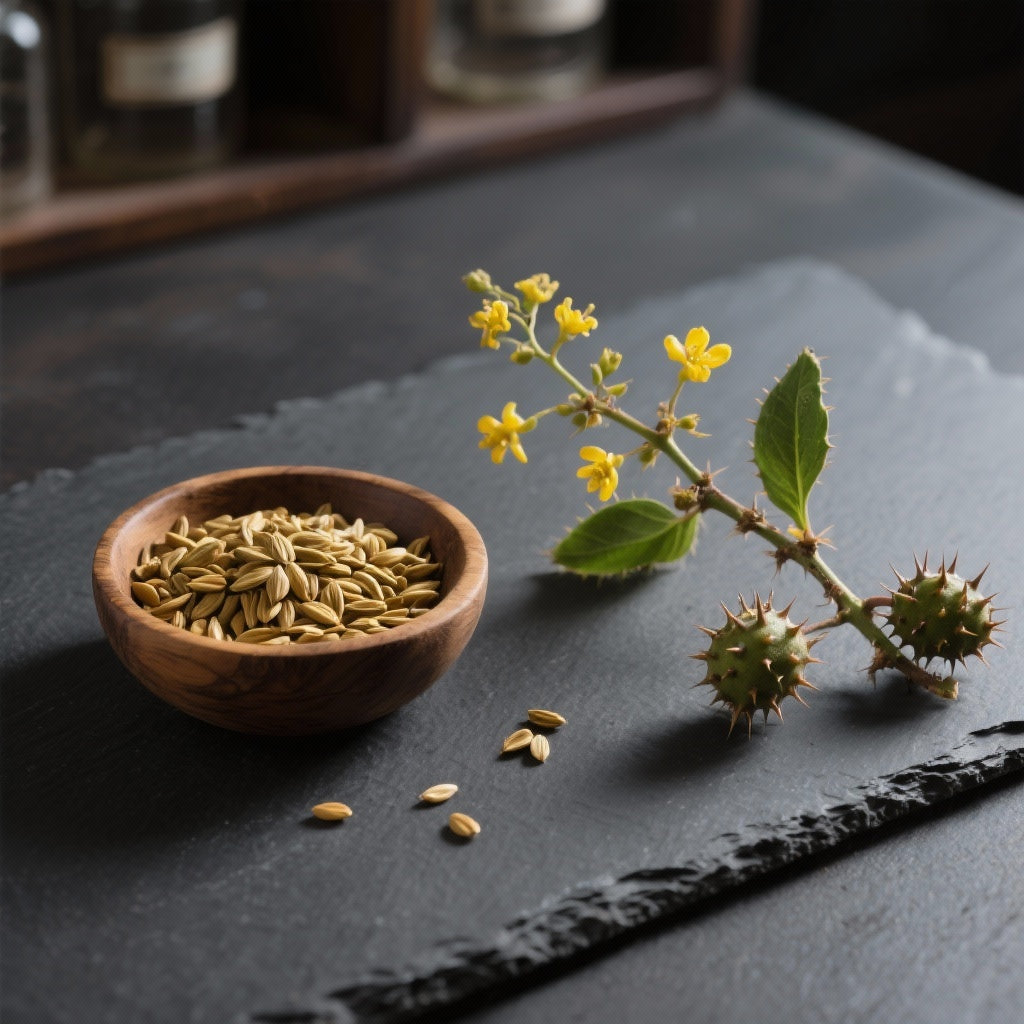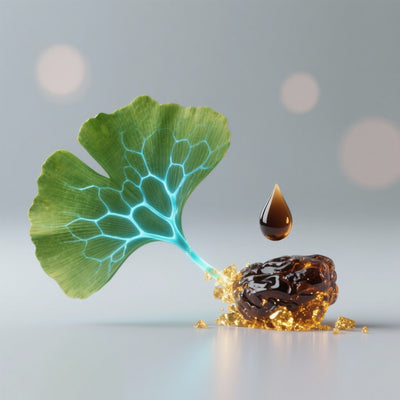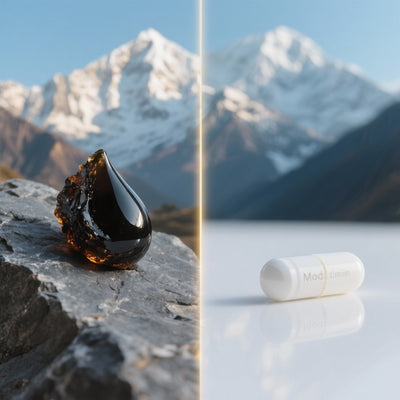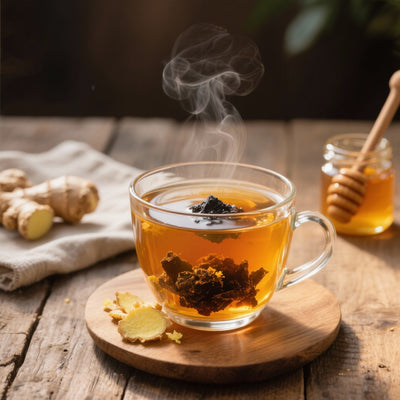Tribulus Terrestris vs Fenugreek: Which to choose to optimize your testosterone?
In the quest for optimal male vitality, enhanced physical performance, and a fulfilling libido, testosterone is the cornerstone. Faced with a natural decline linked to age or lifestyle, many turn to natural solutions. Two names constantly come up: Tribulus Terrestris and Fenugreek . But behind these exotic names lie very different mechanisms of action. Which one is best suited to your goals? This comprehensive guide dissects the science, the benefits, and the nuances to help you make an informed choice.
Understanding natural testosterone boosters
Before diving into our comparison, it's crucial to lay the groundwork. Natural supplements aren't magic potions, but potential allies that work in synergy with a healthy lifestyle. Their role is to support your body's endogenous processes.
Why is testosterone so important?
Testosterone is much more than just a sex hormone. It is a key regulator for many bodily functions in men:
- Muscle mass and strength: It stimulates protein synthesis, essential for muscle building.
- Bone density: It plays a vital role in maintaining a strong skeleton.
- Libido and sexual function: It is directly linked to sexual desire and performance.
- Energy and mood: An adequate level contributes to motivation, self-confidence and prevents irritability.
- Body composition: It helps regulate fat distribution, limiting its accumulation in the abdominal area.
A drop in testosterone can therefore manifest as chronic fatigue, weight gain, low mood, and decreased physical and sexual performance. To learn more about the basics of a healthy lifestyle, explore our lifestyle blog .
Tribulus Terrestris under the microscope
Tribulus Terrestris , also known as Maltese Cross, is a plant that has been used for centuries in traditional Chinese and Ayurvedic medicine, primarily as a general tonic and aphrodisiac.
Mechanism of action: the role of steroidal saponins
Tribulus's effectiveness is attributed to its active compounds, steroidal saponins , and more specifically to protodioscin . The leading theory suggests that protodioscin may stimulate the pituitary gland to produce luteinizing hormone (LH). LH is the hormone that signals the testicles to produce testosterone. By increasing the LH signal, one could theoretically increase testosterone production.
What does science say? A reputation focused on libido
This is where the debate intensifies. While Tribulus's reputation as a testosterone booster is persistent, scientific studies on healthy human subjects are mixed regarding a direct and significant increase in total testosterone levels.
"Several rigorous clinical studies have failed to demonstrate a statistically significant increase in testosterone in healthy men supplemented with Tribulus Terrestris. However, a notable and consistent effect is observed on the improvement of libido, sexual satisfaction, and erectile function."
It therefore appears that Tribulus acts more as a sexual function optimizer and adaptogen, improving the perception of well-being and desire, possibly via other neurological pathways such as androgen receptor signaling in the brain, rather than by massively increasing hormone production.
Fenugreek, a spice with multiple benefits
Trigonella foenum-graecum , or Fenugreek, is an aromatic plant whose seeds are used as a spice, particularly in Indian cuisine, but also as a traditional remedy for various ailments, ranging from digestive disorders to stimulating lactation.
Mechanism of action: optimizing free testosterone
Fenugreek's mechanism of action is different and perhaps more direct. Its active compounds, also saponins (furostanolic acid), appear to act on existing testosterone . The most plausible theory is that fenugreek extracts could inhibit two key enzymes:
- Aromatase: which converts testosterone into estrogen.
- 5-alpha-reductase: which converts testosterone into dihydrotestosterone (DHT).
By slowing down these conversions, fenugreek helps maintain higher levels of free and bioavailable testosterone , the active form of the hormone that the body can actually use. This is a key difference from tribulus.
Scientific evidence: more consistent results
Unlike Tribulus, studies on standardized Fenugreek extracts (such as Testofen® or Testosurge®) have shown more consistent and positive results on testosterone levels, especially free testosterone.
+46%
A 2017 study published in the Journal of Traditional and Complementary Medicine found that supplementation with Fenugreek extract for 12 weeks increased free testosterone levels by 46% in 90% of participants.
These studies also note significant improvements in body composition (reduction of fat mass), muscle strength and libido, effects directly correlated to better testosterone availability.
Tribulus vs. Fenugreek: The Decisive Showdown
Now that the mechanisms are clear, let's put these two plants in direct competition on the points that interest you most.
Quick comparison table
User profiles: who is each plant aimed at?
Your choice will depend entirely on your main objective:
- Choose Tribulus Terrestris if: Your number one concern is a decreased libido. You feel physically fit, but your desire isn't what it used to be. You're looking for a boost to your sexual vitality and overall well-being.
- Choose Fenugreek if: Your goal is related to physical performance. You've hit a plateau at the gym, you're struggling to lose fat, or you're experiencing a general drop in energy and drive. You're looking for more direct hormonal support for your body composition.
How can you incorporate these plants into your routine?
Whatever your decision, proper use is essential. The most effective approach is not simply to consume a plant, but to integrate it into a wellness ecosystem. For ideas on how to balance your diet, check out our recipe blog .
Dosage and recommended forms
For both plants, opt for standardized extracts that guarantee a minimum concentration of active compounds.
- For Tribulus: Look for extracts standardized to at least 45% (ideally 90%) saponins. The usual dosage is between 750 and 1500 mg per day, divided into several doses.
- For Fenugreek: Look for specific extracts (Testofen®, etc.) or those standardized for saponins. The effective dosage is around 500-600 mg per day.
Precautions and a holistic approach
These supplements are generally well-tolerated, but it's always advisable to consult a healthcare professional before starting a new course, especially if you have any pre-existing medical conditions. Remember that the foundation of healthy testosterone levels remains: quality sleep, a balanced diet, stress management, and regular physical activity. For more advice, our main information blog is an excellent resource.
Frequently Asked Questions (FAQ)
- Can Tribulus and Fenugreek be taken at the same time?
- Yes, this is a common synergistic strategy. Fenugreek works to optimize existing free testosterone, while Tribulus may support libido through other mechanisms. This combination can offer a more comprehensive approach.
- How long does it take to see results?
- Most users report noticeable effects after 4 to 8 weeks of continuous use. Patience and consistency are key.
- Are these supplements safe for women?
- Fenugreek is often used by women for other reasons (lactation, premenstrual syndrome). Tribulus is sometimes used by female athletes, but its impact on female hormonal balance is less studied. A medical consultation is strongly recommended for women.
- What is the best time of day to take them?
- It is often recommended to take these supplements with meals to improve absorption and minimize any gastric discomfort. Splitting the dose (morning and evening) can also help maintain more stable levels.
The verdict: a choice based on your goals
In summary, there is no clear winner in the Tribulus vs. Fenugreek debate, but rather two champions in different categories. Tribulus Terrestris is your ally if your primary goal is to reignite your libido and improve your sexual well-being. Fenugreek is the wiser choice if you are looking for scientifically validated hormonal support to enhance your strength, body composition, and free testosterone.
The choice is yours. Assess your needs, listen to your body, and never forget that these plants are tools to complement, not replace, the pillars of a healthy and active lifestyle.











